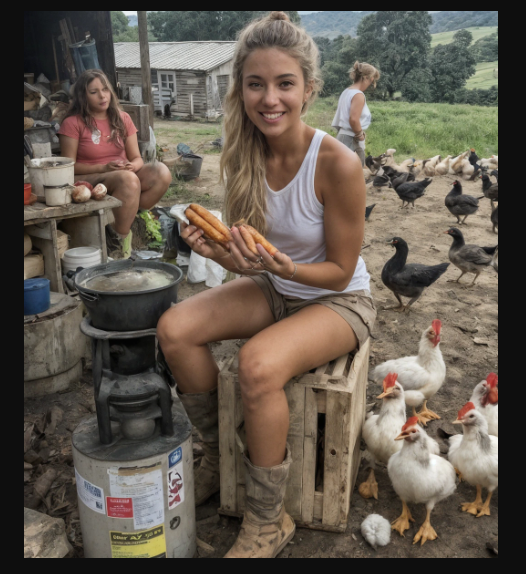Raised on a sweet potato farm just a few miles away from the city, I quickly understood that days begin before dawn and that “vacation” meant attending the county fair. My parents carried the earth beneath their fingernails, embodying a persistence I rarely witnessed elsewhere. For years, I believed that such determination alone was enough to earn others’ respect.
Everything changed when I was accepted into a prestigious scholarship program at a private city high school. It seemed like my big break. However, on the very first day, I walked into the classroom wearing jeans that still smelled faintly of hay. A girl, with a shiny, perfectly done ponytail, whispered disdainfully, “Gross. Do you live on a farm or something?” I chose not to respond, lowered my eyes, and sat down, convincing myself I had imagined it. Yet, the remarks kept coming: “What kind of shoes are those?” “You really don’t have Wi-Fi?” One boy even asked if I came to school by tractor. I stayed silent, focusing solely on my studies and avoiding any mention of where I was from. Still, I felt humiliation burning inside me.
At home, I wasn’t “the farmer’s daughter.” I was Mele: capable of changing a tire, managing chickens, and marketing our produce in ways few people could. My parents had crafted something tangible with their own hands. So why was I ashamed to reveal it?
Turning Point During a School Fundraiser
The pivotal moment arrived during a school fundraiser where each student had to bring something to sell. Most brought supermarket cookies or crafts made by babysitters. I brought our family recipe sweet potato pie, baking six of them. Within twenty minutes, they were all gone.
It was then that Mrs. Bell, the counselor, pulled me aside to share words I would never forget. Before she could finish, a familiar voice interrupted—someone I least expected: Izan. He was respected by everyone—not because he was flashy, but due to his calm confidence. A member of the school board with impeccably clean shoes and a remarkable memory for names, mine included.
“Hey, Mele,” he said, eyeing the empty trays, “did you really make these?” I nodded, unsure where the conversation was headed. He smiled warmly, “Can I get one for my mom? She loves everything sweet potato.”
After blinking twice, I managed to reply, “Of course. I’ll bring it Monday.” Mrs. Bell gave me a knowing smile, as if to say, “I told you so,” adding, “This pie is a piece of who you are. You should be proud and share it.”
“That night, I reflected deeply—not on Izan, but on all the times I had hidden my roots, convinced they diminished me. What if, in fact, they were my greatest strength?”
So, Monday came, and I didn’t just bring a pie. I printed flyers, created a name—”Mele’s Roots”—and prepared cards saying: “Farm-to-table pies, fresh every Friday. Seasonal flavors available.” I imagined only a few classmates might inquire.
By lunch’s end, twelve preorders had come in plus a message from someone named Zuri requesting sweets for her grandmother’s birthday.
- Teachers wanted mini pies for staff meetings.
- One girl even offered a designer jacket in exchange for three pies (which I kindly declined).
- Izan sent a photo of his mother midway through a bite, eyes wide in delight, captioned: “She says it’s better than her sister’s—and that’s high praise from her.”
Laughter escaped me upon reading that message. My father glanced over and asked, “Good news or bad?” “Great,” I answered. “I’d say we’re expanding.”
From that Thursday onward, we started cooking together weekly after homework: pies, cookies, or bread. I absorbed more family recipes during this time than ever before and began sharing these stories in presentations and essays—about the land, grandparents, and years of drought.
Gradually, people started listening.
The girl with the perfect ponytail? She eventually asked for the recipe. I shared a simplified version—no wood oven needed—and I admit, it felt good.
For my final exam project on what shaped my identity, I created a short documentary about our farm: my mother washing carrots in a bucket, my father feeding scraps to the dogs, and me at the county fair behind a hand-painted sign.
When shown to the entire school, my heart raced—I stared at the floor most of the time. But the applause that followed was loud and enthusiastic. Someone even stood up.
Afterward, Izan approached and offered a half-hug, saying, “I told you your story matters.” I smiled and admitted, “It took me a while to believe that.”
The truth is, I had feared losing respect if others discovered my origins. Now, I understand that embracing your history teaches others how to see you. When you own your story, it becomes a source of strength rather than shame.
Yes, I am the farmer’s daughter. That does not diminish me. It anchors me.
Reflecting on this journey reminds us all to be proud of where we come from and to share that pride with others.
In summary, embracing one’s background, sharing family traditions, and being authentic can transform personal insecurities into empowering confidence. Through perseverance and openness, respect from others naturally follows.
